Intrigued by NBC's Dream-y Double Life Drama Awake? You Should Be! Here's How It Works
AwakeIn many ways, Awake is an even riskier bet for NBC than the showtune-happy Smash. The show follows a detective whose reality has splintered following a fatal car accident: one day, he wakes up to comfort his grieving wife because their son has died; in the next, he's a widower living with his son who survived. During one of his mandated therapy sessions, he lays it out: One of these existences might not be real — but he'd rather go on living in both.
More ambitious and certainly more challenging than most network dramas, Awake is not nearly as complicated as traversing through Inception, a comparison some critics have already made. Instead, think of it as a cop drama with a twist, albeit a very ambitious twist -- while Detective Britten (Jason Isaacs) is trying to be a husband one day and a father the next, he's also carrying on with his day job catching bad guys. Each week, he'll have a case to solve, and details or clues from one realm will help him in the other.
Video: Watch the series premiere of Awake
The first hour, directed by David Slade (30 Days of Night), has been deftly — and beautifully — organized into two very separate realities. Time with his wife (Laura Allen) is warm, golden, sun-kissed, while days with his son (Dylan Minnette) are cooler and bluer. Britten also sees different therapists (B.D. Wong and Cherry Jones) and has different job partners (Steve Harris and Wilmer Valderrama), though both are tasked in some way with keeping an eye on him. Four episodes in, none of the narrative is particularly difficult to follow.
More problematic is the NBC landscape: Awake is stuck in a tough timeslot — Thursdays at 10, following the network's low-rated comedy lineup and against established dramas The Mentalist on CBS and Private Practice on ABC. We say, let the network worry about all that. Here's your six-point cheat sheet, straight from creator-executive producer Kyle Killen (Lone Star):
Somber premise, not so somber drama. Awake picks up well after the Britten family car crash. When we meet Britten, he's adjusted well to living a dual life — he even wears different colored rubber bands to help keep his realities separate. In other words, real or not, Britten still has both his wife and son in his life, and that's a gift he wants to take advantage of. "It isn't a show that's relentlessly about grief because, frankly, whether it's healthy or not, he's not a person who is grieving," Killen says. "As far as he's concerned, he has everyone."
Wednesday, February 29, 2012
Intrigued by NBC's Dream-y Double Life Drama Awake? Here's How It Works - Today's News: Our Take | TVGuide.com
'Cougar Town's' Josh Hopkins signs on to NBC comedy pilot

Tuesday, February 28, 2012
TV tonight Feb. 28, 2012: Tattoo artists create portraits on Ink Master

Sunday, February 26, 2012
Return of “The Walking Dead”: A Chat with Showrunner Glen Mazzara | IMDb TV
AMC’s “The Walking Dead” returns tonight at 9 pm with a lot more on the line than the simple question of whether Rick and his group will be able to stay on Hershel’s farm.
There’s the question of how much of a ratings hit the show might take, considering its long midwinter hiatus. AMC split the second season into two parts, and tonight’s episode, “Nebraska,” will be the first new hour that has aired since November 27. The show’s extended absence from the schedule may be less of a concern than the deep divide among fans about the first half of the second season’s storyline. Read a few critical analyses and fan posts about the survivors’ extended camp-out on a farm run by a veterinarian with a no-kill policy towards his zombified kin, and it becomes apparent that people are either loving season two or loathing it.
Maintaining a high level of fan loyalty through the six remaining episodes won’t just be a test for AMC. It’s also a trial for Glen Mazzara, the executive producer who assumed showrunner duties on the series after executive producer Frank Darabont was fired. From the moment he took the reins, Mazzara has been in a tough spot, made tougher recently when details about Darabont’s scrapped Black Hawk Down-inspired prequel episode (starring “Being Human‘s” Sam Witwer) was revealed in various media reports.
Mazzara, whose previous producer credits include FX’s widely-acclaimed drama “The Shield” as well as lower-rated titles such as “Hawthorne” and “Crash,” seems to be taking it all in stride. “I was just telling someone, this is the first time I’m working on a show that people are actually watching,” Mazzara joked. “So I feel very lucky.”
During the recent Television Critics Association Winter Press Tour, IMDb’s TV Editor had a conversation with Mazzara about where the second half of “The Walking Dead” is headed creatively, during which he revealed some details about upcoming episodes and discussed how a lesson that he learned in the writer’s room for “The Shield” will influence the show’s pacing from this point on.
My first question is a point of clarification: How much creative input did you have in the first seven episodes of the second season?
A tremendous amount of creative input. This is a Darabont question, I guess? I wrote an episode during the first season, and I was brought on before any of the other writers. I helped hire them. I was Frank’s number two. But we broke these stories, we were locked in a room for weeks and developed these stories.
When things went down with Frank and I was asked to become the showrunner, we were shooting… I think it was our fourth episode. Our fifth episode came out. Our sixth episode I made changes to — just things where, you know, that script needed a pass. The (midseason) finale was written while Frank was there, but he had never given notes on that. That was a script that I polished and put into production. And then these episodes that are coming out are episodes that I broke with the writers. So I think that’s pretty clean.
But I will say, I went back and I had to re-cut these episodes. I cut these episodes, I’m responsible for all of the editing, post-work, music, I was responsible for all of the usual showrunner duties. So that was a tremendous amount of influence.
… Listen, I respect Frank and I’m happy that he wanted me as his number two. …I wouldn’t say we were partners, but it was a collaborative effort. Frank collaborated with us. But there came a point where the material was drying up in the pipeline, so I had to get in and do some polishing. That’s just normal business. But I will say that the overall arc of, a girl goes missing and then she’s in the barn, that was developed under Frank. The overall arc of the back half of the season, that’s all mine.
I will say that, (regarding) the script for the midseason finale, I think I was lucky that we had a great writer and a great director on that episode. That was sort of me coming out of the gate. Does that make sense?
It makes perfect sense.
What I didn’t want to do was my version of a Frank Darabont show. I wanted to follow, and I wanted to honor the world that he’s created because that’s a world that I love. But I didn’t feel an obligation to try to become Frank Darabont. That isn’t fair to Frank and it isn’t fair to me.
…The voice of the show became different with the midseason premiere. Did you see it yet? That’s my voice.
There are a number of articles and blog posts that have voiced strong opinions about this season. There are people who are kind to it, and there are a number of people who haven’t been so kind.
Well, what are your thoughts?
I enjoy the show. There was never a week that I wasn’t looking forward to a new episode. But I do think there were a number of issues that just seemed to be endlessly cycling and never quite resolved, so that the characters couldn’t move on. I don’t think the issue was being at the farm – that, for me, was not a problem. I know for some people it felt like a bottle episode and their thoughts were along the lines of, “Obviously, it was because the budget was cut.”
That is not accurate.
Yes… for me, there were some characters that were developed quite a bit. I enjoyed Daryl’s character development. But the love triangle between Lori, Rick and Shane… there became a point at which the characters seemed very static, there was very little development or evidence that they were moving forward.
Fine. Okay. So how did you feel after watching the midseason premiere?
The thought that went through my head was, “OK, Rick has put his hat back on. Things are going to change now. Let’s go.”
That’s right. I think Rick got a little lost in the first few episodes. Since I have become showrunner, I have pushed Rick front and center. You can see that in the midseason finale. Rick is the guy who steps forward and puts the bullet into Sophia. Rick’s humanity is his flaw. And Rick is now very much the central character, as he should be, of “The Walking Dead.” And he’s a more compelling character, I think.
There’s a very, very interesting scene, written by Evan Reilly, coming up.
The scene in the bar? There’s a lot of tension there.
Yes. I’m very proud of that scene. Evan Reilly wrote that scene, and Clark Johnson directed it. I think that we are doing a much better job in the second half of the season of progressing the story. There’s a very, very interesting scene in the next episode, at the end of the next episode, between Rick and Lori. All of a sudden you are seeing new sides of characters that you weren’t seeing before, and that’s something that’s coming out in the back half of this season.
I do agree that we can push deeper into our characters, and that’s what we do. But we also amp up the tension. We amp up the action. We amp up the zombies. Everything is on full boil. Again, it’s the back half of the season. So over the course of 13 episodes, you’re going to mark things out. I’m lucky in that I’ve got all the characters established, so we can push things a little bit. I have a good example. You want an example?
Please.
There’s a scene in an episode that you already saw, where Lori confesses the affair (with Shane) to Rick. That is something Frank did not want to do. He did not want that to come out. I felt that that was important to progress the personal stories as well as the plot of finding Sophia.
One of my early jobs was “The Shield.” I did “The Shield” for a long time. We had a rule on “The Shield”: “Move it up. Move it up, burn the bridge right now, we’ll figure out how to get across the river later.” That is very much the motto I am using for “The Walking Dead” from now on. So if people felt like we were stalling, I’ll give it to you. But no more stalls.
In the midseason premiere, I think it’s denser storytelling. And yet, there’s not a lot of zombie stuff. It’s all character stuff.
But people do want the zombies, you know.
I love the zombie stuff! You know what? If you think about it, it’s only been a few hours after the barn…And there are other survivors to contend with, too.
Yes. Couple of things. One is, the farm is no longer safe. The outside world will come crashing in. Two, the midseason premiere is taking place in a few hours after a HUGE zombie massacre. If we have another HUGE zombie massacre right then and there, it’s not going to feel real. It’s not going to feel plausible. It’s going to feel like a video game.
What’s interesting about this show is, if we do zombie attacks, some people say, “Ugh, it’s just the zombie attack of the week.” When we don’t do zombies, people say, “Where are the zombies?!” You can’t win!
(laughs)
But we’re trying. I’m very proud of the (midseason premiere). That episode is indicative of the type of storytelling I want to do in the back half of the season, and I really think our best material is in these next six episodes.
Looking forward to it. Please develop T-Dog more.
You know what? I’ll tell you the truth: T-Dog is a character that has suffered because there are so many other characters. He has some great stuff coming up, some really great scenes. I think IronE Singleton did a terrific job, and it’s a matter of making room for him. That’s a character, if you really look at him, that character’s on borrowed time because he’s not tied into any major story. And yet, he keeps earning his place. T-Dog just gets through it, he’s becoming very interesting.
Sometimes those minor characters are on a slow burn. The Ronnie character was like that in “The Shield.” …We’re learning how to write for that character.
http://tv.blog.imdb.net/?p=2882" title="Post to Twitter">
http://tv.blog.imdb.net/?p=2882" title="Post to Twitter">Tweet This Post
This entry was posted on Sunday, February 12th, 2012, 12:00 pm and is filed under Commentary, Q&A, Talking TV, Tune In Info. You can follow any responses to this entry through RSS 2.0. You can skip to the end and leave a response. Pinging is currently not allowed.
Saturday, February 25, 2012
Executive Producers Jeff Pinkner and J.H. Wyman Peel Back the Layers of FRINGE’s Past, Present and Perilous Future
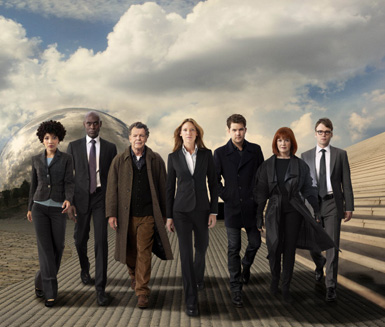
With so many twists-and-turns, alternate verses and timelines, wormholes, doppelgangers and more mind-binding mysteries that one could possibly conceive let alone keep straight!), FRINGE has challenged fans to follow it into the “rabbit hole” and take an extraordinary journey. To help clarify a little bit about the show and where it is going, in a recent conference call with press, executive producers Jeff Pinkner and J.H. Wyman shared their thoughts on the increasingly labyrinthine storyline and teased fun things to keep an eye out for as the FRINGE story continues this season.
What about tonight’s episode “The End of All Things” were you most excited about?
JEFF: Well, I don’t think we would play favorites in the stories we’re telling. It’s sort of like the episode was designed to tell a few things that all interacted, and the story between Olivia and Nina and any time Jared Harris as David Robert Jones is on the screen is just fantastic. And allowing Michael Cerveris as our observer to, sort of, like peel back some layers and reveal some truths about what his agenda has been and to really use that as an opportunity to revisit the things we’ve done before in the show. All of it was really fun and exciting for us.
Has the Observer intel been something you’ve been wanting to let loose with for a while now?
J.H.: Well that’s an interesting point because we always said that you’ll find out about the Observer this season and that we’re going to investigate them a lot more. So we’re excited about it all because that’s a highlight–the Observers are a highlight. It’s just–for us to kind of constantly break what you think you know, and sort of reset, and have to go, “Wow, I didn’t see that coming.” That’s kind of why we get up in the morning. It’s to, sort of, like take people on for the ride. So we’re excited about what’s coming up too for people.
How soon is it going to become evident exactly what David Robert Jones uber-plan is specifically and how Olivia fits into it? Is she a distinct key that he needs?
J.H.: Spoiler alert! We’re restricted a little bit, right? Obviously, we can’t tell anything. But I think that David Robert Jones, just remember that on FRINGE we try to make like nothing is as it seems. That there’s always a little more to the story behind the story. He’s definitely a large part going forward. I think a lot of things will come full circle. But you’ll be like, oh, wow. And again, I hate to use the word but recontextualize a lot of things that you’ve already seen.
How big a part is Nina going to play? What kind of role is she going to play going forward because she’s been through a trauma that’s as bad now as anything Olivia’s been through?
JEFF: Tune in tonight. I think you’re going to enjoy it a lot.
J.H.: You know, it’s funny cause people have always been, since season one, they have always been saying, “Nina is such a great character. We’ve got to give her something that’s kind of cool and show her” because you know she’s an incredible actress. Dare I say, so much more capable of the things that we’re capable of giving her to do on the show just by the constraints of characters amount of screen time. So we’re always looking for something very special for her and we just wanted it to be right. We didn’t want to just sort of give her an episode that was kind of, oh, this is the Nina-centric episode. We wanted to make sure that you actually could watch a tour de force and allow her to do the things she does so well and have it be worthy of her ability. So we feel like I think that’s where we are right now. You’re going to see some stuff that you’ll be pretty blown away, I think.
JEFF: And we’ll reveal something to you, that is we have a lot of fun with the names of our alternate versions of our characters, Walternate for example, and Blair who named her alternate version, Meana.
There’s some online talk about Charlie Francis returning. Can you guys touch on that?
JEFF: I think that we have been in talks with Kirk about coming back. As we’ve said before there is nobody ever really dies on FRINGE or so it would seem. But there’s no, hey tune in on x and such week to see him. There’s nothing definitive yet.
With Peter accepting Walter’s hypothesis about how he is somehow transforming this Olivia into his Olivia, he seems to have discarded the thought that she has independent memories that he could not have created like the Semtex thing a couple of weeks ago. So using that plot point as the reference, what do you see Sam’s debating? How do they react to,’ oh, that’s an error in continuity’? Do they talk about it? Do they really turn it over and does any of that ever influence the way you think about your own writing?
JEFF: Well, to take that part of the question first. As you of course know, by the time we see feedback on any individual episode we have written and filmed several episodes ahead, TV show. We don’t have the ability to change our story telling on a dime. It’s very much like trying to steer a cruise ship. The reaction time is delayed. Having said that, we’re well aware of how intelligent our audience is. We’re well aware that, sort of, FRINGE is a show that you really need to lean forward to, into and pay attention to and think about. It’s not designed to be a show that you can watch while you’re folding laundry. So we’re well aware of the questions that our audience is inevitably going to ask. We’re well aware of how carefully they watch the show and hold us to continuity. We’re certainly aware of the debates that are going to occur. Our audience holds us to an incredibly high standard of continuity and authenticity and emotional authenticity. We don’t toy with that but being aware of that we oftentimes will write stories in order to spark debate. But we’re very determined to always give the answer. We don’t want to leave a lot of things open to debate at the end of the day.
There are at least four universes going on at any one time. Do you film them separate? I mean, is it confusing? How does that work for you guys and the actors trying to keep everything straight?
J.H.: I think that that’s actually funny. The characters and actors are so, sort of, in tuned with what they’re doing that the minute that they get an opportunity to play in one universe or the other or one time or the other, they jump at it. So this is a huge deal for them. We don’t really have to talk to them much. They’re so great. They know exactly where they are. What their characters are doing. Where they’re coming from. What version of the characters they’re playing which is a credit to the talent and their ability. But for us, Jeff and I, no, we don’t get confused. We don’t shoot them separately. We shoot them as they come up and as we write them. They’re sort of like, “Hey, okay. We’re in this universe or this week.” It seems to be very clear to us. But I’m sure it’s not clear to everybody else.
JEFF: What’s actually amazing though is after a couple of years of living with these characters and writing these characters and talking about these characters, we and the writers as we sit in the writers room and break episodes or whatever, it strikes you every once in awhile that you’re talking about a character that’s played by the same actor who you’ve been talking about forever. But we talked about like the character dying or something, you get emotional and then you realize, oh but wait, the actor is still on the show.
This season we’ve had some really great singular cases and kind of just stand alone episodes. But this next episode is mythology heavy and really speaks to the larger arc this season. What can you say about how it’s going to affect what we see in the next couple of months in the final stretch here?
JEFF: Well it’s definitely, as they say, a game changer in that our characters learn a lot more and the audience is going to learn a lot more about sort of the uber-plot of our season, our season bad guy David Robert Jones. Certainly for Peter this season and Olivia and Walter is going to start to unfold in ways that, hopefully, will be really both satisfying and challenging to our characters. It’s sort of like, the 14th out of 21 or 22 episodes and it’s very much a hinge episode that’s going to launch us into the back half of the season.
Can you talk about the directing process? In particular, did you want to do that one particular episode or is it just how you came up into the rotation?
J.H.: Well, first of all it was the most incredible experience. Directing, when you run a television show it’s kind of like it’s something that not many people actually get the time to do because you’re so consumed with everything that’s going on. You can’t just disappear. So fortunately, I have an amazing partner that allows us to do these different things who will be directing an episode himself soon I’m sure. But it’s amazing. I love directing and I think that it allowed me to get closer to the actors and actually work with them on a level that I haven’t before and really get down there with them. I would jump at the chance to do it anytime I could. The episode, itself, was something that was not in the rotation. I was supposed to direct a couple of episodes last year and just time didn’t permit. If I can’t go away then I can’t go away and somebody else has to step in. So that’s sort of what happened last year. This year, the same thing happened at the beginning of the season I was going to do one. But work just put an end to that. So I couldn’t do it. But then one was coming up that we were thinking about writing and I really felt close to it. The opportunity came up where somebody had fallen out and I felt that this is the perfect time because everything was completely under control. It allowed me to go and do it. But it is. It’s an episode that’s really close to me. It’s about love and it’s about all the great things that we talk about on FRINGE. To us, Jeff and I, it’s kind of like a perfect version of what a FRINGE show is because it has a great terrifying element to it, which is very Fringey. On the other hand it has this incredible love story aspect and things that people are going to be really, really excited for, we believe, as far as the relationships in the show. So it was an honor to do it and it was just incredible. It turned out really well. We love it. It was just an incredible experience.
Did you know that this was a break point here because it works out really well that you have a pivotal episode. It works right up to the break to get people excited to come back a month later. So were you able to plan it that way? And second of all, when you refer to the fact that if the season ends and there isn’t a fifth season people will be satisfied. Is that because you’ve already written the final episode of this season or because you’ve already shot it or what’s the deal with the final episode?
JEFF: Well, in fact we did not know that this was going to be a break. We thought that the break was going to come after the next episode which also is a wonderful episode to take a break on. We’re sort of in a zone of episodes right now where each one is pretty amazing. Each one either turns the story or resolves something important or leaves a cliffhanger. So the several episodes, each is pretty awesome in itself and also is very important to the overall patchwork of the season. We are very happy that this ended up being one before we went on a little break. But I think the fans are going to be very well satisfied to come back and watch the next one as well. As far as the finale, no, we have not written it. In fact, we are talking about it sort of specifically as soon as we get off this phone call. But we do know what it is. We’ve known the shape of our season before we even started this year.
Do you think that part of the reason the ratings have gone down this season is being opposite Supernatural and Grimm?
J.H.: I don’t know. Honestly, because if you look at the DVR numbers, Friday night is a tricky spot. I truly believe that there needs to be some new way of measuring who’s watching what and some way. Because I feel like there’s satellites that can see a Levi’s tab on the back of your jeans but they can’t tell you who’s watching which television show. I’m a little suspicious. But, look, the truth is that people–it’s changed. Times have changed. People, it’s busy. People have hard lives. They’re making it work. They’re coming home from work. They’re telling us when they want to watch the show because the DVRs, they go up like crazy. I mean, 80% is nuts. So they’re watching. They’re just not watching on Friday. You know, those other shows that you mentioned are great. I don’t know that their ratings have gone up so much that it would be like they’re taking viewers or anything. I just think that, in general, people are–there’s only the people who have the Nielsen boxes and if they’re not watching live or they’re not watching it, you’re done. It has nothing to do with what the mass is because when the big numbers come out on DVRs you understand there are a lot of people watching the program, just not on Friday nights. So they’re dictating to us, well, another time. I don’t want to watch it right now. I want to watch it tomorrow morning or I want to watch it on Saturday night with my girlfriend or I don’t know.
JEFF: There are TV producers, we can tell you how they experience it. They spend a lot of time analyzing numbers and analyzing the competition and sort of knocking on the doors of the people that work at the studio and saying, “Change our night. Change our time. Don’t you see what you’re doing to us by having us on …?” We don’t do that. Our approach has always been, and maybe to our detriment, but our approach has always been that the best thing that we can do for our show is to write the best show possible. So as Joel said earlier, we sort of leave these questions and these issues that we can’t control to people who can and we just write the best version of FRINGE we know how. The one that satisfies us. The one that makes us excited to go into work everyday. The one that makes us feel something. We’ve been really, really gratified that the people that watch the show respond to it in the way that they do. Beyond that, we just sort of leave it to the gods.
How important do you think social networking is to the success and especially with the new Fringe-inuity in Twitter and GetGlue campaigns and everything?
JEFF: I think we all operate now in a world that is so different than it was even two or three years ago. The fans have access to the show and access to the creators even if it’s not direct. I don’t know any television creators that don’t follow the message boards. Just the feedback is so immediate to see what is working and what isn’t working and what’s working better than you anticipated. Then there’s such a temptation to just constantly write things that are going to make the fans happy — constantly just want to satisfy the fans and not sort of stay true to whatever the vision was of – oh, sometimes it takes a little bit of unhappiness to make those happy payoffs work better. That’s something that is fascinating to us and has really changed the way that stories are told I think.
J.H.: Yes. You get an immediate reaction. Jeff is right. I think, Twitter for us is important because we have incredible fans that are always fighting for us and trying to spread the word and so devoted. For us, that’s why we do it. So to hear them and to like see the responses instantaneously it’s really amazing because you get to see, like Jeff said, what’s working and what’s not. But I feel really close to the fans because we have dialogues with them on Twitter. I think they feel closer to us and I don’t think that was possible several years ago. Nobody kind of felt connected to the show. I think our fans are really connected to the show in a deep way not just because they’re fans, but because we interact with them.
What have the conversations been lately with Fox and what are you guys hearing about for next season?
J.H.: Obviously that’s a big question. We get that every year. This is the God-honest truth. We, Jeff and I, just do what we do. You have no control. We didn’t have control last year, the year before either, and the year before. So we can only do what we do and that’s make the show that we love, continue to follow the path, the stories that we want to tell, great compelling stories, week to week that interests our fans and really hope for the best. I think that any show that doesn’t have huge ratings that’s kind of what you’re always up against. Meanwhile, conversations are ongoing. Everything is running the way that things usually run in these types of situations. I guess, we’ll find out like everybody else. But we don’t fret about it because, really, it’s out of our control. We can only step back and do our work and therein lies the past serenity. So we’re hoping for the best and just doing what we love.
JEFF: One of my favorite stories when I was a kid was The Little Engine That Could. So I think we’re the little engine that could constantly. You know, I think I can, I think I can. We’re always struggling, and struggling, and struggling, and hoping, and hoping, and hoping. We just keep making the shows that we love and the good news is we can never rest on our laurels of just like knowing we’re going to be on forever. So we’re constantly challenged to write the very best story we can week in and week out hoping that that will just allow us to keep telling more of them.
J.H.: Yes. I mean, it’s a strange thing. It’s a sci-fi show on network television and everybody knows that that in itself is an amazing feat that we’ve been on for so many years. It’s like, you guys, the press and everything has been so incredibly kind and so incredibly supportive that we feel like it’s a success in any way, shape or form. It’s an expensive canvas, everybody knows it. To do what we do every week it costs a lot of money and you have to have a return on it. That’s show business and you’ve got to do it. We just hope that the dollars and cents can make sense and we can continue doing it. But if this was the last season, at least I’ll speak for myself and Jeff can comment on it. If this is the last season I would feel, obviously, incredibly sad because I know how much of the story that we have left to tell and that we would love to tell. But in the same breath I kind of feel like I would feel that I could take care of the fans. That’s the most important to us that we feel like we have an ending that would leave people feeling like, wow, I feel sad but satiated. I feel like that was definitely worth my four years of investment. I really love these characters and I can see where it would have gone. But I feel good. That’s all we’re concerned about is to make sure that the fans don’t feel like, wait, what? What happened? I’ve invested four years of my life and I don’t get any kind of resolution that makes sense. That’s not what’s going on. And to be 100% frank, our partners at Fox would never want to consciously allow that to happen. So everybody knows that Jeff and I are very prepared. We’re ready for anything. Hopefully we go on. But it’s out of our control.
With shows like FRINGE, ALCATRAZ, TERRA NOVA all having a tough time in the ratings. How do you guys see the state of sci-fi on TV today and how it can survive in the future?
J.H.: Well, like I said in the last answer. You’re right. It’s the strangest thing. Jeff always says, it’s kind of a funny point. He says that, you know, in the cinema everybody goes to sci-fi. They’re like the biggest movies and in television nobody wants to touch it with a barge pole. It’s strange. I think it’s because maybe there’s a legacy of television shows that sort of felt a certain way or depicted sci-fi in a certain way that turns off a lot of viewers. And maybe there’s a negative connotation. What was so great about Lost is that it sort of came to the front door as a drama that was straight up and really gave you these sci-fi underneath it all. So it backed into sci-fi show, at least in my opinion. So people were like, as soon as they got hooked, they were like, okay, I’m there. But the minute you show it’s about this, it’s about strange science, things out of control, it takes an investment. I think that in the future when people start to realize that sci-fi is probably one of the only genres. I actually love the genre because it allows you to tell such human stories. I think once people start to realize the consistency of quality that is coming, and maybe not getting recognized at the moment and then in retrospect we’ll be recognized. But they’ll start to sort of open up their minds a little more, saying like, “Wow this is great. I’m going to tune into this.” It’s not just for the geeks and the people that are into it. It’s actually really fascinating. That’s my take on it.
Will fans be satisfied if there isn’t a season five, like will this season have a pretty good finale?
J.H.: Oh, yes. I mean, fortunately, at the end of every season we sort of close the chapter and start a new. That’s the sort of the language of the series now. So it just sort of organically can come to a conclusion that we love. ![]()
To see the big reveal with the Observers and what Nina and her alt-verse counterpart are really up to, be sure to tune in for the new episode of FRINGE entitled “The End of All Things” which airs tonight at 9PM on Fox (CityTV in Canada), and definitely tune in after the 3-week break for the reveal of the final mysteries. FRINGE returns Fridays starting March 23rd on Fox. (CityTV in Canada)
Wednesday, February 22, 2012
Reaction to the firing of TTC GM Gary Webster
 That the TTC board voted to fire General Manager Gary Webster yesterday didn't ultimately come as a shock given all the talk about the meeting prior to its taking place, but now the task is figuring out what it means for Toronto's transit future and for the relationship between the mayor and city council. Here's a sample of the speculation and reaction that's circulating in the wake of yesterday's decision.
That the TTC board voted to fire General Manager Gary Webster yesterday didn't ultimately come as a shock given all the talk about the meeting prior to its taking place, but now the task is figuring out what it means for Toronto's transit future and for the relationship between the mayor and city council. Here's a sample of the speculation and reaction that's circulating in the wake of yesterday's decision.
Gary Webster
There are times when situations arise that are outside of our control. But the one thing we always have control over is how we respond to those situations. I ask that you respond to all of this by doing what you all do so well - by continuing your professionalism and delivering the safe, courteous service that our customers expect and deserve. — Excerpt from an email sent to TTC employees posted by the Star.
Rob Ford
"I support the Commission's decision on the departure of Mr. Webster. Gary has served Toronto and the TTC well in his years of service. He was an important element in the organization's many successes to date and can proudly point to a list of accomplishments.
But, it's time for the organization to look forward. The Commissioners tell me this. Councillors tell me this. The general public — and subway, streetcar and bus passengers all tell me it's time for change." — Excerpt from a note posted the mayor's Facebook page.
The Star
The imbroglio over Toronto transit is unprecedented. The transit commission, though a separate legal entity, always defers to city council, as council approves its budget and appoints the commissioners. Now, add another log into a raging fire — a mayor unwilling to abide by city council's decision — and fireworks begin.
"Mayor Ford was elected promising subways over light rail. He said the private sector, not taxes, would build it. For a year he's failed to show how, but killed the light rail plan. And he has not sought a city council vote." — Royson James
The Sun
"Thankfully, the five commissioners who voted for Webster's axing -- Denzil Minnan-Wong, Norm Kelly, Vince Crisanti, Cesar Palacio and Frank DiGiorgio -- were having none of this leftist theatre of the absurd.
I knew Augimeri was a lost cause. But I still can't understand why TTC Chair Karen Stintz, Vice-Chairman Peter Milczyn and Commissioner John Parker so vociferously supported a CGM who has been out of his depth for years, is downright resistant to change, failed to improve customer service, runs a secretive organization rife with nepotism and can't seem to bring a single major project (capital, IT or whatever) within budget." — Sue-Ann Levy
The Globe and Mail
"Firing him now reeks of spite. It confirms what many people already feel about the mayor's blunderbuss, my-way-or-the-highway approach to governing the city. It conflicts with the mayor's pledge to cut waste. Firing Mr. Webster only a year and a bit before the end of his contract could cost the city $500,000 and more.
Worse, it sets a dangerous precedent that could intimidate the other leading public servants who advise the mayor and city council on public policy. Only weeks ago, Toronto Ombudsman Fiona Crean warned about the increasing politicization of the public service. "It can be exceedingly difficult for staff to speak truth to power and provide their best advice as dutiful public servants." — Marcus Gee
The National Post
The Post points out — via the citation of a previous article published in the paper — that Webster's predecessor left on account of political manoeuvring.
David Miller (on Twitter)

Monday, February 20, 2012
Fisher Price DVR – More TV for your Kids!
It happened again yesterday, what could have been a pleasant dinner at our favorite restaurant ended up being a whine festival, and not the good kind of wine either. It just wasn’t my daughters day, and sitting still while grown-ups chatted and lingered over coffee wasn’t her idea of a good time. Now I certainly don’t advocate TV over good parenting, but sometimes you just gotta do what you gotta do, know what I mean?
Fisher Price is hoping that you do, because on the off chance that your little darlings aren’t spending enough time glued to your television, they have developed a new gadget, aimed squarely at your poor little technology deprived kiddos. Meet the Kid Tough Portable DVR a “cool, kid-friendly handheld device.” Parents simply attach the Kid Tough portable DVR to its included base unit and then, to the TV and set top box, and you can easily record your kid’s favorite shows.
The Kid Tough DVR also has a 3.5 inch touchscreen and pretty simple, kid-friendly controls. The device contains a rechargeable battery that provides between 4 and 6 hours of play time (it charges right on the base station) and the on board memory holds about 2 hours of TV time, with a much appreciated Micro SD slot for added storage (and extra long dinners) .
It seems like the unit will carry around about a 150 dollar price tag, and have 2 colors to choose from, blue or pink. Of course the downside is that you’ll be waiting till late spring or early summer before you’ll be able to get one in your kids hot little hands… but oh how I can picture my next relaxing meal! or waiting at the doctors office, or shopping, and I actually get to use MY own iPad. Genius.
Conference Calendar – The global conference and expo finder.
[ Fisher Price DVR – More TV for your Kids! copyright by Coolest Gadgets ]
Related Posts:
- Fisher-Price gets into the Portable DVR act
- ESPN Better Batter has automatic reload and baseball sound effects
- Fisher Price Kid-Tough Portable DVD Player is Durable and Entertaining
- Ripped Pants! SpongeBob is a hoot
- Fisher-Price Retro Classics
Tiny Thumb Drive Can Decode an Entire Human Genome in Six Hours
Canadian International Auto Show 2012
 If the streets are banal reality, auto shows are a fantasy land where every car is unique, shiny and new, and the occasional auto is a true work of art. It's a thought you can't escape after you spend a day at the Canadian International Auto Show and head out onto streets filled with dusty, salt-sprayed cars in sensible shades of brown, blue and silver, the overwhelming majority of which are the dull quotidian types: compact sedans and hatchbacks, trucks and SUVs, with nary a supercar to be seen.
If the streets are banal reality, auto shows are a fantasy land where every car is unique, shiny and new, and the occasional auto is a true work of art. It's a thought you can't escape after you spend a day at the Canadian International Auto Show and head out onto streets filled with dusty, salt-sprayed cars in sensible shades of brown, blue and silver, the overwhelming majority of which are the dull quotidian types: compact sedans and hatchbacks, trucks and SUVs, with nary a supercar to be seen.
Media day at the CIAS saw the assembled car brands displaying their wares at the Metro Toronto Convention Centre struggle to show their best face - listening to the brief presentations given to the press pack being led around two huge rooms, it seemed like every auto maker had their best year ever, as they massaged sales figures, statistics and awards to accentuate the high notes. The exceptions were notable, from Honda's spokesman admitting that 2011 was "a tough year," to a GM presentation cautiously talking up a good fourth quarter and Chrysler proudly stating that they'd paid back their government loans.
Then there was Hyundai's rep laying on talk of gratitude, humility and struggle, which probably came out easier after that morning's announcement that their Elantra had won the Canadian Car of the Year award, which would be nice if the Elantra wasn't precisely the sort of utterly average car that makes the streets outside the auto show seem like East Berlin when you could only get your Lada in oatmeal or beige after signing on to the ten-year waiting list.
 It didn't help that many of the concept cars unveiled at this year's CIAS were stunning, including Hyundai's own Blue² model, built to showcase their hydrogen fuel cell powertrain, and equipped with a futuristic dash and interior the looks like something from the recent Tron sequel. Like most alternative fuel technologies, hydrogen still has a lot of hurdles to jump before it shows up in any subdivision garages, and it'll be a long time before the interior of your airport rental looks this nice, but the promise of this sort of technological and aesthetic leap has the general effect of making so much of what you can buy today look, well, tedious.
It didn't help that many of the concept cars unveiled at this year's CIAS were stunning, including Hyundai's own Blue² model, built to showcase their hydrogen fuel cell powertrain, and equipped with a futuristic dash and interior the looks like something from the recent Tron sequel. Like most alternative fuel technologies, hydrogen still has a lot of hurdles to jump before it shows up in any subdivision garages, and it'll be a long time before the interior of your airport rental looks this nice, but the promise of this sort of technological and aesthetic leap has the general effect of making so much of what you can buy today look, well, tedious.
Which isn't to say that every concept car was a breathtaking shot of future envy. Honda's Accord concept, the centrepiece of their display, would probably only startle you if you'd never seen big rims or a candy apple red paint job, while the most noteworthy thing about Lincoln's MK7 concept was a panoramic glass roof that would never make it to production. The MK7 also sports a striking front grille that suggests that Ford, finally, has realized that their luxury brand will never beat Cadillac by being duller than GM's land yacht maker.
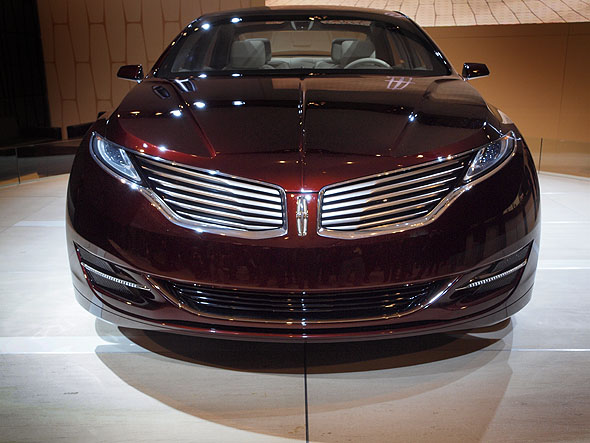
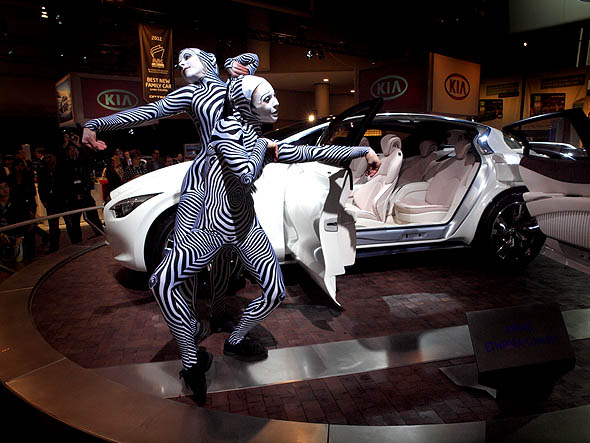 The best thing about Infiniti's Etherea concept was probably its rear suicide doors - another detail unlikely to make it to production - but it was hard to focus on the Etherea thanks to the Cirque du Soleil acrobats hired to pose around it during the media presentation. VW's Bulli concept van is a tribute to their iconic '60s microbus, and while being presented as a 6-seater EV with an impressive 300km range, was put on the show floor to draw consumer feedback, with the possibility of selling it with a range of powertrains, which might potentially include hybrid or VW's clean diesel. It's also nice to see that at least one automaker intends to court the much-overlooked jam band market.
The best thing about Infiniti's Etherea concept was probably its rear suicide doors - another detail unlikely to make it to production - but it was hard to focus on the Etherea thanks to the Cirque du Soleil acrobats hired to pose around it during the media presentation. VW's Bulli concept van is a tribute to their iconic '60s microbus, and while being presented as a 6-seater EV with an impressive 300km range, was put on the show floor to draw consumer feedback, with the possibility of selling it with a range of powertrains, which might potentially include hybrid or VW's clean diesel. It's also nice to see that at least one automaker intends to court the much-overlooked jam band market.

 Greened-up auto technology was offered by almost every major manufacturer with the exception of Mazda, who conspicuously doubled down on their commitment to improving internal combustion engines. Nissan gave pride of place in their display to an electric version of their NV200 van, while Mercedes-Benz showed off their battery-powered Smart ForTwo, which will apparently come with their new eBike, like the treat in a CrackerJack box.
Greened-up auto technology was offered by almost every major manufacturer with the exception of Mazda, who conspicuously doubled down on their commitment to improving internal combustion engines. Nissan gave pride of place in their display to an electric version of their NV200 van, while Mercedes-Benz showed off their battery-powered Smart ForTwo, which will apparently come with their new eBike, like the treat in a CrackerJack box.

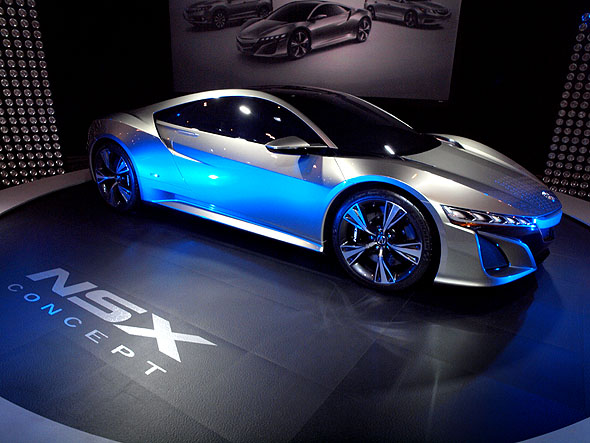
 Which is all very nice, but no one can pretend that an auto show crowd has come anywhere near the end of their affection for the internal combustion engine, which is why Chevy still puts its constantly refreshed range of muscle cars on display, and Acura gave centre stage to their NSX concept, a revival of their supercar that they hope to get into production in three years. Mercedes-Benz might have the Smart, but their display still focused on the SL550, the convertible roadster version of the gull-winged SLS.
Which is all very nice, but no one can pretend that an auto show crowd has come anywhere near the end of their affection for the internal combustion engine, which is why Chevy still puts its constantly refreshed range of muscle cars on display, and Acura gave centre stage to their NSX concept, a revival of their supercar that they hope to get into production in three years. Mercedes-Benz might have the Smart, but their display still focused on the SL550, the convertible roadster version of the gull-winged SLS.

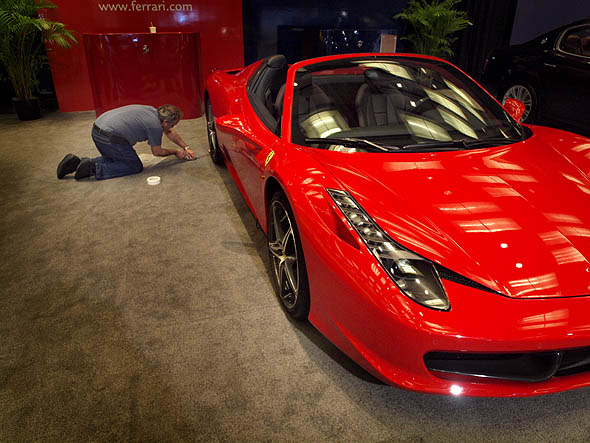 Wandering through the two big convention floors, you couldn't help but wonder where the real auto porn was hiding - the supercars and "exotics" that could be found here back when the CIAS spilled over onto the floor of the SkyDome. The Ferraris, Porches, Aston Martins and Maseratis were still here, though they were banished to a room in the basement, where two Fisker electric supercars shared space with the Bugatti Veyron and Aston Martin's One-77, the sorts of cars that most of us will only ever see driven on episodes of Top Gear.
Wandering through the two big convention floors, you couldn't help but wonder where the real auto porn was hiding - the supercars and "exotics" that could be found here back when the CIAS spilled over onto the floor of the SkyDome. The Ferraris, Porches, Aston Martins and Maseratis were still here, though they were banished to a room in the basement, where two Fisker electric supercars shared space with the Bugatti Veyron and Aston Martin's One-77, the sorts of cars that most of us will only ever see driven on episodes of Top Gear.


 Jaguar managed to avoid this banishment thanks to being bought by Tata, the major Indian automaker that also reversed colonialism and bought Land Rover. Their display was built around the C-X16 concept, a more than faintly Porsche-like sports car that they're threatening to put into production as a hybrid. Which is all very nice, but you can't help but wonder when Tata will finally emerge from their British Trojan horses, make a foray into North America and goose the subcompact market for which they made their name in Asia.
Jaguar managed to avoid this banishment thanks to being bought by Tata, the major Indian automaker that also reversed colonialism and bought Land Rover. Their display was built around the C-X16 concept, a more than faintly Porsche-like sports car that they're threatening to put into production as a hybrid. Which is all very nice, but you can't help but wonder when Tata will finally emerge from their British Trojan horses, make a foray into North America and goose the subcompact market for which they made their name in Asia.
 Because the subcompact market could certainly use a boost. Fiat launched their 500 with a splash last year, but didn't have much that was new to show besides the Abarth high performance rebuild of the little 4-seater and a Gucci-branded version. The Mini has also gone into creative idle - their display was devoted to the Goodwood Mini, a high-end luxury upgrade inspired by Rolls-Royce with an interior tricked out in wool, walnut, silk and cashmere, and revealed by a phalanx of hired models dressed as chauffeurs.
Because the subcompact market could certainly use a boost. Fiat launched their 500 with a splash last year, but didn't have much that was new to show besides the Abarth high performance rebuild of the little 4-seater and a Gucci-branded version. The Mini has also gone into creative idle - their display was devoted to the Goodwood Mini, a high-end luxury upgrade inspired by Rolls-Royce with an interior tricked out in wool, walnut, silk and cashmere, and revealed by a phalanx of hired models dressed as chauffeurs.
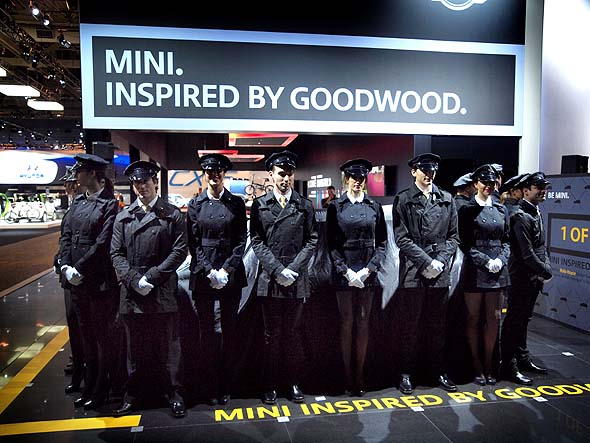
 But these are all distractions from what is the ultimate business of an auto show - to show shoppers the new car they'll buy, after entertaining them with fantasies that are either unaffordable or unbuildable. Ford, the automaker that was once synonymous with the car itself, knew this when they unveiled their new Fusion line, which they plan to offer with a choice of five powertrains, and which faintly distinguished itself with a new grill reminiscent of the Mini.
But these are all distractions from what is the ultimate business of an auto show - to show shoppers the new car they'll buy, after entertaining them with fantasies that are either unaffordable or unbuildable. Ford, the automaker that was once synonymous with the car itself, knew this when they unveiled their new Fusion line, which they plan to offer with a choice of five powertrains, and which faintly distinguished itself with a new grill reminiscent of the Mini.

 Chevy showed off its new Spark, a urban mini which began life as the Daewoo Matiz, and is being marketed to young car buyers with a range of finishes named after food (jalapeno, lemonade, salsa.) Dodge unveiled a revived Dart built from the Alfa Romeo Guiletta platform, another entry-level with feints at sportiness, though its base level variant will have the same engine as the Fiat 500. This is the reality of the global auto market - transnational companies swapping designs, names and parts across their lines, producing what are largely competent, safe, well-designed vehicles that end up looking indistinguishable on the road.
Chevy showed off its new Spark, a urban mini which began life as the Daewoo Matiz, and is being marketed to young car buyers with a range of finishes named after food (jalapeno, lemonade, salsa.) Dodge unveiled a revived Dart built from the Alfa Romeo Guiletta platform, another entry-level with feints at sportiness, though its base level variant will have the same engine as the Fiat 500. This is the reality of the global auto market - transnational companies swapping designs, names and parts across their lines, producing what are largely competent, safe, well-designed vehicles that end up looking indistinguishable on the road.
 Which is why something like BMW's Vision ConnectedDrive ended up being an auto show hit. A concept car as it should be - remarkable, improbable, confounding and probably unbuildable - it sat on the display floor like a rebuke to almost every car in the building. Depending on which way you looked at it, you saw bits of C- and D-type Jaguars or some Teutonic iteration of the Adam West batmobile, but behind its metallic grey skin is something that is, depending on how you feel about driving, either miraculous or insidious.
Which is why something like BMW's Vision ConnectedDrive ended up being an auto show hit. A concept car as it should be - remarkable, improbable, confounding and probably unbuildable - it sat on the display floor like a rebuke to almost every car in the building. Depending on which way you looked at it, you saw bits of C- and D-type Jaguars or some Teutonic iteration of the Adam West batmobile, but behind its metallic grey skin is something that is, depending on how you feel about driving, either miraculous or insidious.
 Like any really beautiful car, it looked fast just sitting still, but it was really built to showcase BMW's range of driving technology - the computerized wonders that are already being offered with features like parking assist and lane change warning, and which will likely evolve and proliferate until we no longer need to touch our car's steering wheel or put a foot on its accelerator. Which means that the Vision's tactile, inviting cockpit, with its promise of speed and comfort, is actually a spider's web, inviting drivers to let down their guards and eventually become superfluous. It was the best car I saw at the auto show, and it's a beautiful, evil thing.
Like any really beautiful car, it looked fast just sitting still, but it was really built to showcase BMW's range of driving technology - the computerized wonders that are already being offered with features like parking assist and lane change warning, and which will likely evolve and proliferate until we no longer need to touch our car's steering wheel or put a foot on its accelerator. Which means that the Vision's tactile, inviting cockpit, with its promise of speed and comfort, is actually a spider's web, inviting drivers to let down their guards and eventually become superfluous. It was the best car I saw at the auto show, and it's a beautiful, evil thing.
ADDITIONAL PHOTOs by Roger Cullman




